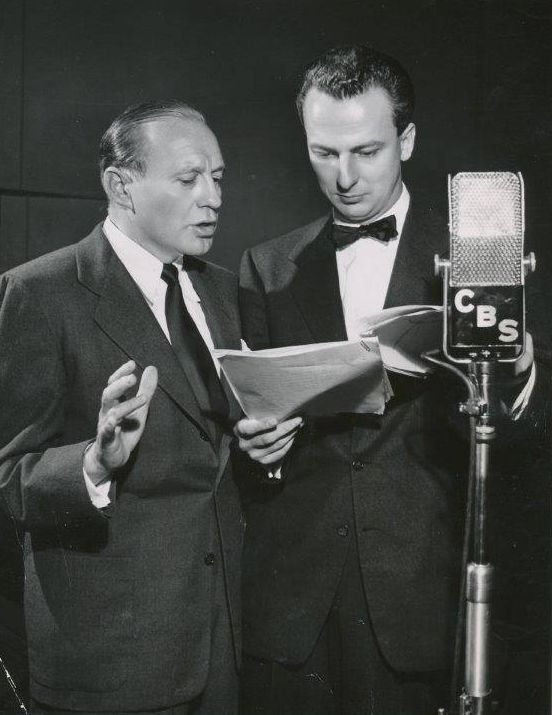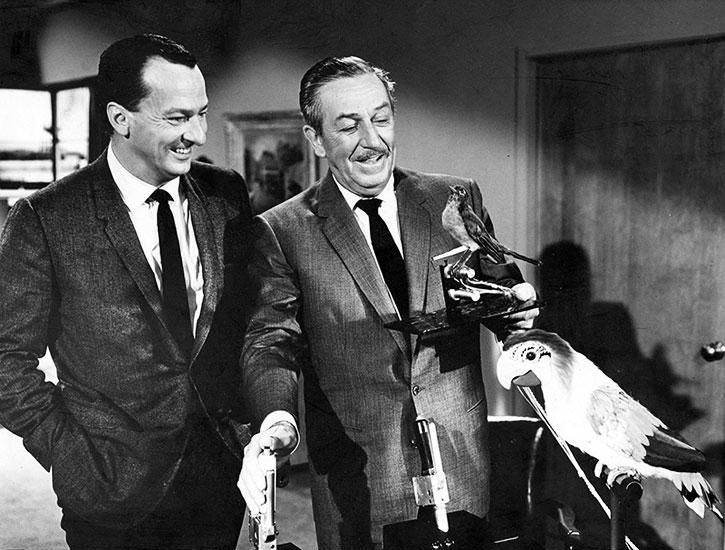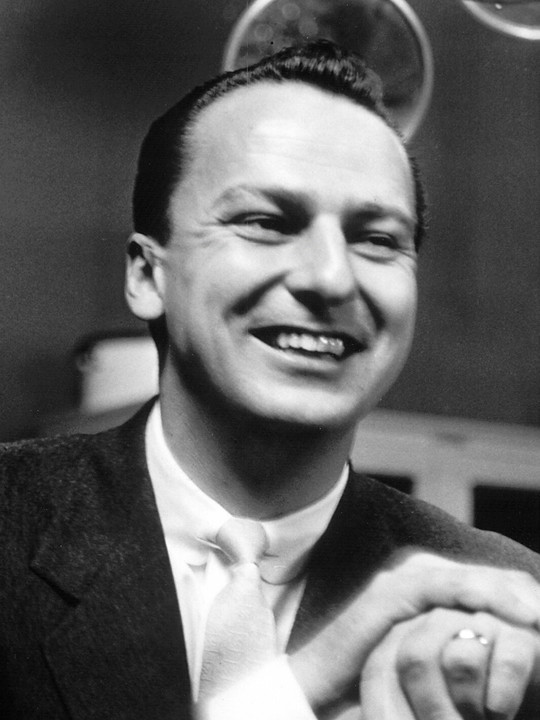Happy Birthday, Fletcher Markle!
Posted by Ivan G. Shreve, Jr. on Mar 27th 2016
Today’s birthday celebrant was once dubbed “the Canadian Orson Welles”…and after leaving The Great White North in 1946, Fletcher Markle—born on this date in Winnipeg, Manitoba in 1921—would not only direct and produce Welles’ The Mercury Summer Theatre (in 1946) but contribute (though uncredited) to the director’s cult film noir The Lady from Shanghai (1947). Fletcher went on to make significant inroads into movies and television…but radio always held a special place in his heart.
Though born in Winnipeg, Fletcher Markle grew up in Vancouver, where he enrolled at the University of Vancouver…and left school two years later to write scripts for the Canadian Broadcasting Corporation. He was only eighteen and considered a “wunderkind,” producing radio dramas for both local stations and the CBC (featuring a troupe of actors that included future star comedian Alan Young). During his stint with the Royal Canadian Air Force from 1942 to 1945, Markle continued working in radio. After being demobilized, he journeyed to England to write and direct radio plays. It was there that Fletcher landed a small role in a motion picture entitled Journey Together (1945), which was his second contribution to motion pictures (after writing and appearing in a 1944 short titled The V-1: Story of the Robot Bomb).

Producer Alexander Korda persuaded Fletcher Markle to move to the U.S. to try his luck in Hollywood. Markle cut his teeth in American radio writing scripts for The Columbia Workshop. In 1947, after successfully overseeing Mercury Summer Theatre, the twenty-six-year-old Fletcher was tapped to tackle a most prestigious assignment: directing and producing CBS Radio’s sixty-minute anthology drama Studio One. The network had such high hopes for the program (dubbed “the most ambitious series in radio”) that CBS scheduled it opposite the NBC Tuesday night powerhouse combo of Fibber McGee & Molly and The Bob Hope Show. Markle ensured that the series would set itself apart from similar shows by refusing celebrity “stunt casting” (he’s talking to you, Lux Radio Theatre) and remaining faithful to the source material. Studio One premiered on April 29, 1947 with an adaptation of Malcolm Lowery’s “Under the Volcano” that featured true radio veterans like Everett Sloane, Joe DeSantis, and Robert Dryden. In hindsight, perhaps the Tiffany network was just using the series as a sacrificial lamb…particularly since for the first six months of its run, Studio One could only be heard on the East Coast. (It lasted a solitary season, ending July 27, 1948.)
Markle’s work on Studio One (which he later duplicated when the show transitioned to TV in 1948) allowed him to take the reins on The Ford Theatre, another hour-long drama that was entering its second season on CBS starting October 8. Ford’s inaugural season on NBC was quite similar to Studio One’s in that the creative minds behind the program eschewed Hollywood’s glittery stars in favor of radio professionals…but by the time Markle took over, the network insisted that he revamp Ford into Lux Radio Theatre redux. Fletcher wasn’t happy about this, and occasionally commented about the show “taking the yellow brick road” in the press. The Ford Theatre would receive a pink slip at the end of its second season, beaten by the formidable competition of other anthology dramas of its type. Like his later duties on the TV version of Studio One, Markle would sit in the director-producer’s chair when Ford made its move to the small screen (re-titled The Ford Television Theatre).

While flexing his radio muscles, Fletcher Markle continued with his career in movies at this time; he was the writer-director (and even had a small role as a nightclub customer) of Jigsaw (1949), a film oddity worth checking out for the celebrity cameos contributed by Marlene Dietrich, Henry Fonda, John Garfield, Burgess Meredith, Everett Sloane, and Marsha Hunt. He also held the reins on Night Into Morning (1951), a melodrama with Ray Milland and future First Lady Nancy Davis Reagan, and The Man with a Cloak (1951), a you-have-to-see-it-to-believe-it Gothic thriller that for reasons unknown allows star Barbara Stanwyck to sing. (You have been warned.) Fletcher’s last feature film directing credit was The Incredible Journey (1963), a Walt Disney Studios caper about three animals (two dogs and a cat) attempting to find their way home after being lost on vacation (this one was remade as Homeward Bound: The Incredible Journey in 1993).
With radio on life support in the 1950s, Fletcher Markle concentrated his efforts on the small screen. In 1953, he produced and directed a TV sitcom version of the stage/movie success Life with Father, and two years later supervised (as well as hosted) the anthology series Front Row Center. His directing/writing/producing credits include such shows as The George Sanders Mystery Theater, Panic!, M Squad, Thriller, Hong Kong, Father of the Bride, Festival and Telescope. Once a radio man, however, always a radio man; Markle worked on such radio revival series as The CBS Radio Mystery Theatre and The General Mills Radio Adventure Theatre and was part of the creative team behind The Sears/Mutual Radio Theatre. Fletcher Markle passed on in 1991.

To celebrate Fletcher Markle’s birthday, Radio Spirits recommends you check out Golden Age of Television, Volumes 1-5, a DVD set featuring episodes of Studio One—the anthology series that represented much of Mr. Markle’s best work in television drama. We’ve also a collection of Mutual Radio Theatre broadcasts, with liner notes by yours truly: an excellent example of the attempts to revive Radio’s Golden Age. We’ve saved the best for last: our Jack Benny collection Be Our Guest features the star comedian in a March 4, 1949 Ford Theatre broadcast of his notorious “The Horn Blows at Midnight”…and in our Great Radio Comedy set, you can hear Fletcher Markle guest on Jack’s show from February 20, 1949 along with Jack Warner…both of whom try to talk Benny out of doing the Ford Theatre program!

